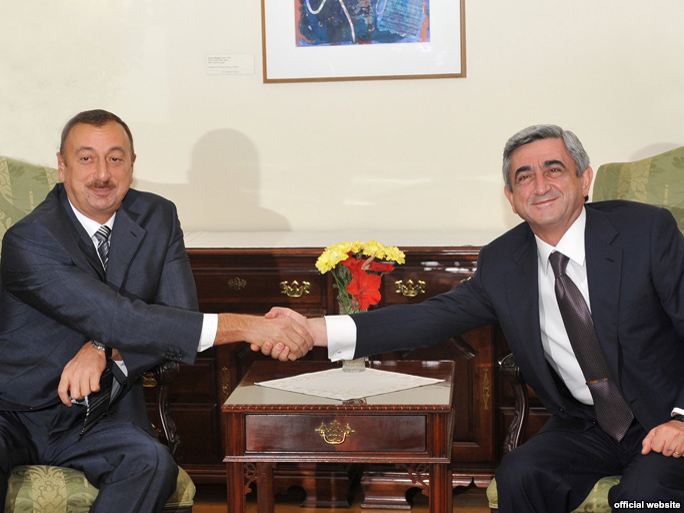
Armenia, Azerbaijan Again Fail to Agree On Karabakh Peace Framework
Publication: Eurasia Daily Monitor Volume: 8 Issue: 125
By:

The presidents of Armenia and Azerbaijan failed to reach any tangible agreements during their latest negotiations, all but dashing renewed international hopes for the resolution of the Karabakh conflict. The conflicting parties blame each other for the failure of the summit hosted by Russian President Dmitry Medvedev in Kazan on June 24. The fiasco could further complicate the long-running Armenian-Azerbaijani peace talks mediated by Russia, the United States and France under the aegis of the Organization for Security and Cooperation in Europe (OSCE) Minsk Group.
Presidents Serzh Sargsyan and Ilham Aliyev raised fresh expectations of a breakthrough after their previous trilateral meeting with Medvedev held in Sochi, in March. They reportedly discussed and made progress on the latest version of the “basic principles” of the conflict’s resolution drafted by the three mediating powers. In a joint statement issued during the G8 summit in the French city of Deauville on May 26, Medvedev, US President Barack Obama and French President Nicolas Sarkozy urged Sargsyan and Aliyev to finalize an agreement on these principles at Kazan (www.osce.org).
Armenian Foreign Minister, Edward Nalbandian, and his Azerbaijani counterpart, Elmar Mammadyarov, appeared to take a significant step towards the signing of such a framework peace accord during their June 12 meeting in Moscow mediated by the Russian Foreign Minister Sergei Lavrov. In virtually identical written statements, Yerevan and Baku said the two ministers narrowed their governments’ differences on “a number of key issues of the basic principles.”
In a further sign that a long-awaited Karabakh settlement may be imminent, Obama telephoned Aliyev and Sargsyan the day before the Kazan summit. The White House press service said he “strongly encouraged” them to overcome their remaining differences and “offer the people of Armenia, Azerbaijan, and Karabakh a better future for themselves and for their children” (www.whitehouse.gov, June 23).
The Armenian and Azerbaijani leaders clearly failed to do that during their four-hour negotiations in Tatarstan’s capital. In a joint communiqué with Medvedev issued afterwards, they said vaguely that they only reached a “mutual understanding on a number of issues whose resolution would help to create conditions for the approval of the Basic Principles.” They did not elaborate on the statement.
The Armenian side was quick to blame Baku, with Nalbandian saying that Aliyev scuttled a deal by demanding “about a dozen changes” in the text of the draft agreement (Armenian Public Television, June 25). Azerbaijani officials did not explicitly deny these claims. Responding to them, Mammadyarov said Yerevan itself rejected earlier versions of the peace framework proposed by the mediators. He said the Kazan meeting failed to live up to expectations because “the Armenian side requires maximum concessions from Azerbaijan” (Trend, June 25). Both foreign ministers at the same time sought to downplay that failure, saying that their presidents remain committed to continuing the difficult search for a compromise solution.
Precisely what prevented an agreement at Kazan is not yet known. One possible reason is the continuing disagreements on crucial details of a future referendum in Karabakh that would (according to the proposed settlement) determine the disputed territory’s final status, which remains the main bone of contention. The Sargsyan government has apparently insisted that the mediators set a concrete date for that vote. The Azerbaijani side has been against any referendum dates, at least until recently.
The Moscow daily Kommersant cited unnamed Russian officials as saying ahead of the Kazan summit that under the existing peace plan the referendum would take place “several years” after the start of the liberation of virtually all seven districts in Azerbaijan proper that were fully or partly occupied by Karabakh Armenian forces during the 1991-1994 war. The original plan developed by the mediating troika in 2005-2006 set no time frames for the would-be plebiscite, and the then Armenian President Robert Kocharian seemed to have no problem with that. Still, Kocharian made clear that the strategically important Kelbajar district, which is sandwiched between Karabakh and Armenia, would be given back to Azerbaijan only after the parties agree on when the vote will take place. According to Armenian and US diplomatic sources, Aliyev rejected this condition.
The US, Russian and French diplomats co-chairing the Minsk Group have yet to announce any further steps. They held separate meetings with Aliyev and Sargsyan in Kazan but made no statements afterwards. Testifying before the European Parliament on June 15, the US co-chair, Robert Bradtke, and his French opposite number, Bernard Fassier, indicated that the mediators will have to think of a new peace formula if the conflicting parties fail to agree on the Minsk Group plan soon.
Kommersant on June 27 quoted an unnamed senior Kremlin official as saying that Medvedev is so frustrated with the outcome of the Kazan talks that he will organize another Armenian-Azerbaijani summit only if the parties make, in advance, a firm commitment to sign up to the basic principles. “Unless Armenia and Azerbaijan display a readiness soon to solve the accumulated problems, we will consider this mediating mission to be over,” he said (Kommersant, June 27).
In their joint statement, Medvedev, Obama and Sarkozy warned that “further delay” in the conflict’s resolution would call into question Armenia’s and Azerbaijan’s commitment to peace. A Dayton-style imposition of a peace deal on the two sides is highly unlikely, however, not least because of Russia’s and the West’s differing geopolitical agendas. The mediating powers may content themselves with more modest objectives such as the prevention of another full-scale Armenian-Azerbaijani war.
Western analysts monitoring developments in the South Caucasus see a growing likelihood of such a war, pointing to an ongoing military build-up in Azerbaijan. Armenia has so far been able to offset it with close military ties with Russia. A Russian-Armenian defense agreement signed in August 2010 is intended to further deepen these defense ties. The dominant sense in Armenian political and expert circles is that Aliyev will not act on his regular threats to forcibly win back Karabakh and the surrounding territories in the near future.
“For many reasons, war would not benefit any of the parties, even though they like, especially in Azerbaijan, speaking of that variant,” Arif Yunusov, a prominent Azerbaijani analyst told Regnum on June 27, adding “In fact, there is simply no alternative to negotiations. Therefore, negotiations will continue” (Regnum, June 27).




